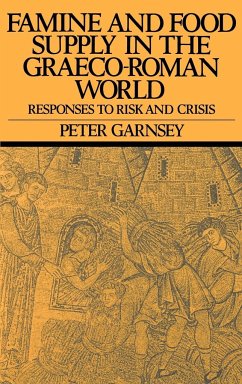The first full-length study of famine in antiquity. The study provides detailed case studies of Athens and Rome, the best known states of antiquity, but also illuminates the institutional response to food crisis in the mass of ordinary cities in the Mediterranean world. Ancient historians have generally shown little interest in investigating the material base of the unique civilisations of the Graeco-Roman world, and have left unexplored the role of the food supply in framing the central institutions and practices of ancient society.
Table of contents:
Part I. The Incidence and Severity of Food Crisis; 1. Famine and shortage; 2. The frequency of food crisis; 3. The infrequency of famine; Part II. Survival Strategies: 4. Subsistence and survival: the peasantry; 5. Supply and distribution: urban communities; Part III. Food Supply and Food Crisis in Athens c. 600-322 BC; 6. The resources of Attica; 7. The beginnings of dependence; 8. Rulers of the sea; 9. Vulnerability and vigilance; 10. From uncertainty to crisis; Part IV. Food Supply and Food Crisis in Rome c. 509 BC-AD 250; 11. The beginnings of empire; 12. Rulers of the Mediterranean; 13. Food and politics; 14. Rulers of the world; 15. The subjects of Rome; Bibliography; Index.
The first full-length study of famine in antiquity. The study provides detailed case studies of Athens and Rome, the best known states of antiquity, but also illuminates the institutional response to food crisis in the mass of ordinary cities in the Mediterranean world.
Table of contents:
Part I. The Incidence and Severity of Food Crisis; 1. Famine and shortage; 2. The frequency of food crisis; 3. The infrequency of famine; Part II. Survival Strategies: 4. Subsistence and survival: the peasantry; 5. Supply and distribution: urban communities; Part III. Food Supply and Food Crisis in Athens c. 600-322 BC; 6. The resources of Attica; 7. The beginnings of dependence; 8. Rulers of the sea; 9. Vulnerability and vigilance; 10. From uncertainty to crisis; Part IV. Food Supply and Food Crisis in Rome c. 509 BC-AD 250; 11. The beginnings of empire; 12. Rulers of the Mediterranean; 13. Food and politics; 14. Rulers of the world; 15. The subjects of Rome; Bibliography; Index.
The first full-length study of famine in antiquity. The study provides detailed case studies of Athens and Rome, the best known states of antiquity, but also illuminates the institutional response to food crisis in the mass of ordinary cities in the Mediterranean world.








